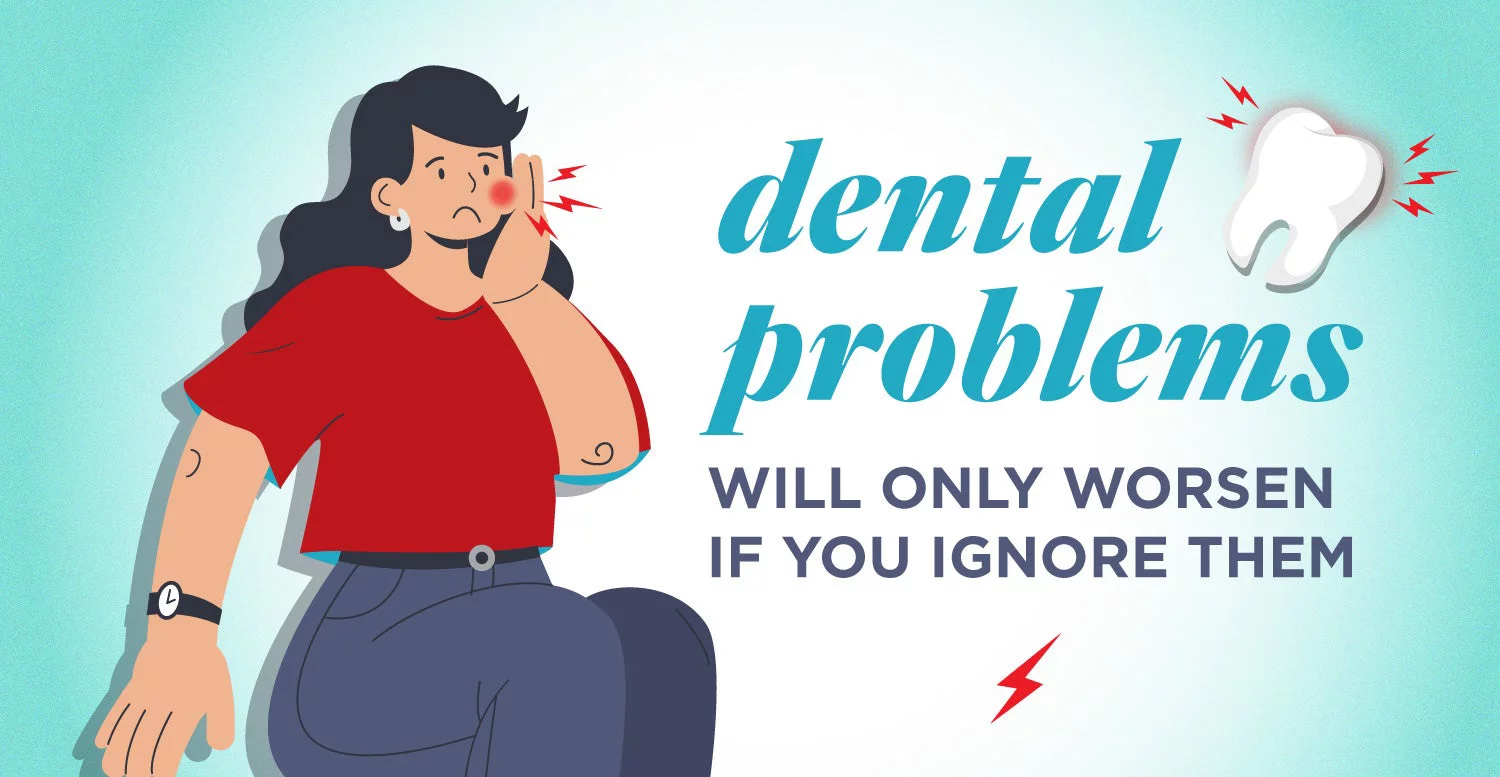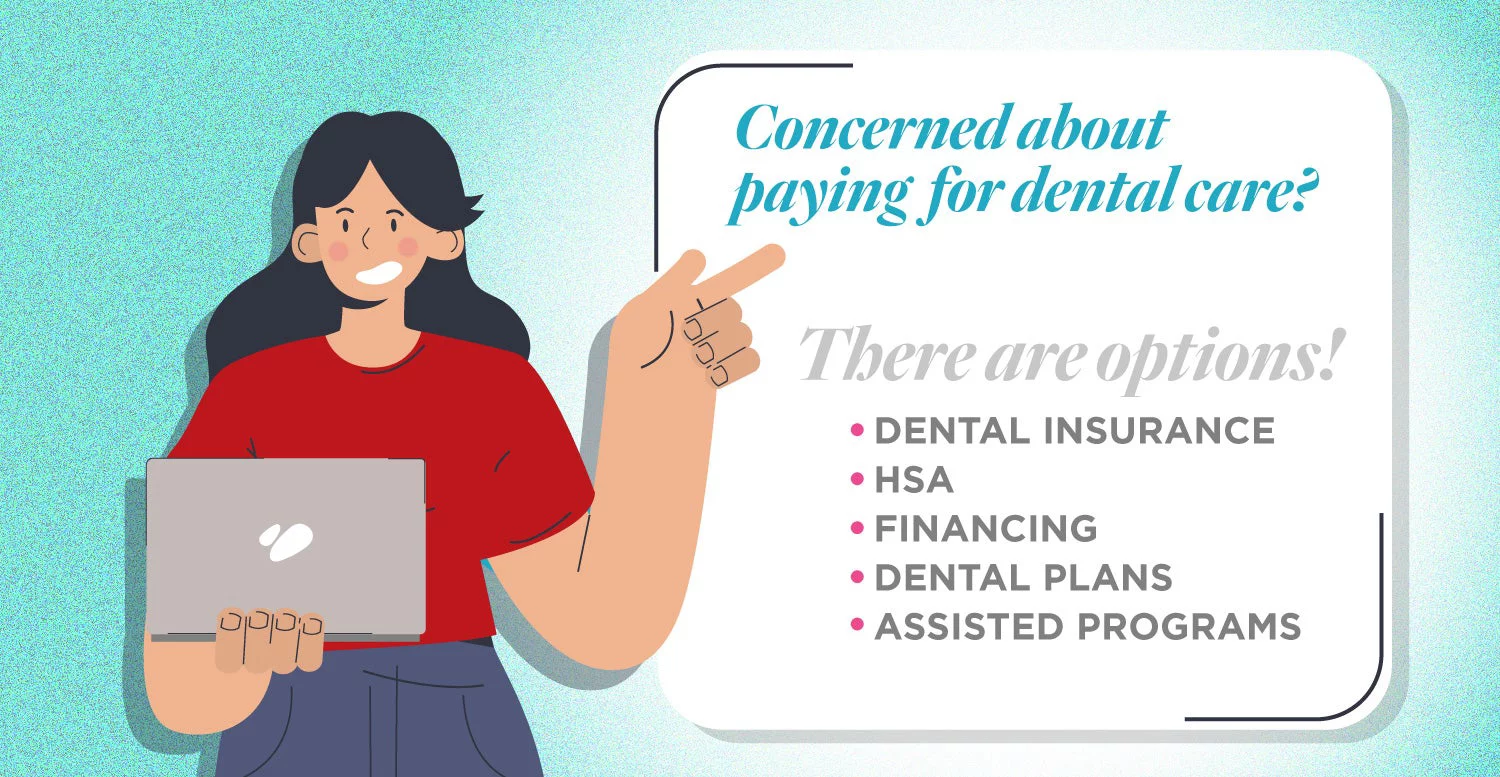According to the American Dental Association, private dental insurance spending increased by 11%, while out-of-pocket spending on dental care rose 13% between 2020 and 2021.
Why Dental Care Is the Most Common Type of Care Adults Put Off
What percent of Americans can't afford dental care? Even before the pandemic in 2019, over 15% of Americans did not receive dental care because of the cost.
Whether or not you have dental insurance can make a big difference in how often you get your mouth in front of a dentist. In 2021, over 80% of those with dental insurance saw their dentist within the year. At the same time, only 55% of patients without dental insurance schedule an appointment with their dentist.

Consequences of Delaying Dental Care
Cavities
Tooth decay, cavities, or caries all refer to the same condition in your teeth. If you forget to brush your teeth, you may feel a filmy substance as you run your tongue over your teeth. This bumpy, sticky film is called plaque. Bacteria in plaque break down sugars from the foods you eat into an acid that damages the enamel of your teeth. If the plaque is not brushed away, it becomes hard, protecting the bacteria so they can further eat away at the enamel, causing a hole or cavity in the tooth.
If a cavity is not caught early, it will get bigger and deeper. A cavity could lead to a more involved dental procedure, such as a root canal, if ignored.
Gum Disease
Another consequence of allowing plaque to build up around the base of your teeth is that it can lead to periodontal disease. When plaque hardens, it is called calculus, and it can build up around your gums and even under your gum line, near the root of the tooth.
Gingivitis is a precursor to a more serious form of gum disease, called periodontitis, that can cause your gums to bleed, pull away from the teeth, and, eventually, lead to tooth and bone loss.
Heart Complications
If severe gum disease goes untreated, it can even affect more than just your oral health. As the bacteria and plaque harm your teeth and gums, the bacteria can enter your bloodstream, leading to complications with your heart, such as arrhythmia and heart disease.

Ways to Address Dental Care Cost Concerns
Avoiding dental care leads to more severe and costly problems for your oral and overall health. While inflation continues to make stretching your dollar harder, some options exist to help address concerns about paying for dental care. So, what are a patient’s financial options to reduce the cost of dental care?
Dental Insurance
Health Savings Account
By opening up an HSA, you can save money for medical and dental needs before taxes. An HSA also benefits you by lowering the costs of your copayment, deductible, and coinsurance. You can open this account through your employer, a health insurance company, or a bank or other financial institution.
Financing Dental Care
Whether or not you have dental insurance, paying for dental care can still be taxing. Copays and other out-of-pocket costs quickly add up. For insured and uninsured patients, financing dental care can be an excellent option. Dental services like Smile Generation can connect you with the best dentist for you and your family, as well as with financing options that break large dental bills down to affordable monthly payments.
Smile Generation Financing Marketplace offers options such as:
- Smile Generation Financial Credit Card: This card can be used for dental expenses at any Smile Generation-trusted locations. You can avoid any interest payments if you pay the balance in full before each month's due date.
- ScratchPay: This is a payment plan specifically for medical or dental expenses. You can choose the frequency of payments so that it is affordable and predictable.
- In-house Payment Plan: After making an initial payment to a dental office upfront, patients will pay the rest of their balance through recurring credit or debit card payments.
Discounted Dental Plan
These dental plans include a predictable annual payment based on how many people are in your household and the benefit of discounted rates on dental services. Through the Smile Generation Dental Plan, you can get discounts between 20-50% off of services you need to keep your mouth healthy.
Assisted Programs
In some cases, Medicaid can also cover dental benefits for qualifying individuals and families. However, Medicaid primarily covers health care benefits more often than dental needs.
Additionally, the Children’s Health Insurance Program (CHIPS) provides financial assistance for children who qualify for medical benefits, and it also includes dental benefits most of the time.
Find a Dentist Near You
If you are searching for a dentist offering affordable options to pay for dental care, Smile Generation can connect you with the best dentist for you and your family. While inflation continues to affect many everyday expenses, do not let your oral health suffer because of the cost of dental care. With multiple options available, your mouth can get the care it needs without breaking the bank.
Find your trusted, local dentist today!
Sources
- Elflein, John, "U.S. Adults and Children Visiting the Dentist at Least Once in 2021, by Insurance Status." Statista, 13 June 2022, https://www.statista.com/statistics/1310325/consumers-visiting-the-dentist-by-insurance-coverage-status-us/
- Erlinger, Catherine, "Gum Disease and the Heart." The Heart Foundation, 26 May 2017, https://theheartfoundation.org/2017/05/26/gum-disease-and-the-heart/
- "Health Savings Account (HSA)." HealthCare.Gov, 27 Apr. 2023, https://www.healthcare.gov/glossary/health-savings-account-hsa/
- Michas, Frédéric,"Percentage of People Who Did Not Receive Needed Dental Services in the Past Year Due to Cost in the U.S. from 1999 to 2019." Statista, 15 Nov. 2022, https://www.statista.com/statistics/188054/persons-who-were-denied-dental-services-in-the-us-due-to-cost/
- "U.S. Dental Spending Up in 2021." ADA, 2023, https://www.ada.org/resources/research/health-policy-institute/us-dental-spending-in-2021
- "Where Can I Find Low-Cost Dental Care?" HHS, 18 Sept. 2017, https://www.hhs.gov/answers/health-insurance-reform/where-can-i-find-low-cost-dental-care/index.html
Smile Generation blog articles are reviewed by a licensed dental professional before publishing. However, we present this information for educational purposes only with the intent to promote readers’ understanding of oral health and oral healthcare treatment options and technology. We do not intend for our blog content to substitute for professional dental care and clinical advice, diagnosis, or treatment planning provided by a licensed dental professional. Smile Generation always recommends seeking the advice of a dentist, physician, or other licensed healthcare professional for a dental or medical condition or treatment.








